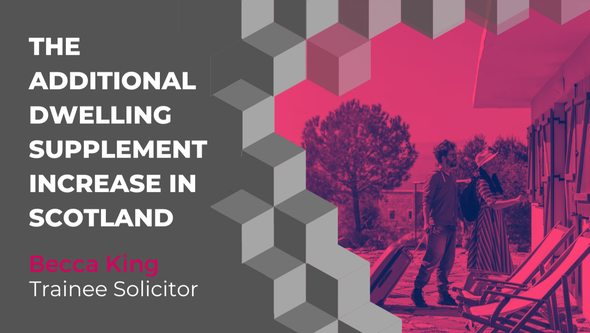
There are various reasons why you may consider purchasing a second residential property. Maybe you are looking to invest in a buy-to-let property, or maybe you would like to have a holiday home to escape to on the weekends and during the holidays. However, it is important to be aware that owning additional property in Scotland considerably affects how much tax you are liable to pay when purchasing residential property. Land and Buildings Transaction Tax (LBTT) is one of the most significant costs to consider when purchasing property in Scotland and the Additional Dwelling Supplement (ADS) is a further charge which must be considered when purchasing any additional property in Scotland.
So, What Exactly Is The ADS?
The ADS is a one-off tax that is payable, in addition to LBTT, when a buyer or buyers purchase a residential property while already owning another. The ADS also applies in situations where no LBTT is actually payable. This property tax, therefore, becomes a concern when someone seeks to buy a residential property in Scotland while already owning another property (or several) located anywhere in the world.
When Is The ADS Payable?
This one-off tax is payable on purchases of residential investment properties, holiday homes and second homes etc. where the purchase price is £40,000 or more and where the purchaser is not replacing their existing main residence. This tax is also payable in scenarios whereby a buyer purchases a property to be used by family and friends, even if they do not charge them rent.
However, if you were to purchase an additional residential property in Scotland with the intention of selling your original main residence, then any ADS that you paid on that purchase can be claimed back. Although, it is important to note that this can only be reclaimed where you sell your original property within 18 months of the completion date of the purchase of your new property.
Another important principle in relation to the ADS, is that spouses are classed as and treated as ‘one unit’ for the purposes of determining whether any ADS is due. Therefore, if your spouse owns a property in his or her sole name, and thereafter you decided to purchase a property in your sole name, you would be liable to pay ADS on that purchase simply because your spouse already owns another residential property. Somewhat surprisingly, it is irrelevant that your name is not on the title deeds, you and your spouse are treated as one. The same principle can also apply in scenarios where couples intend to cohabit with one another.
How Much Is The ADS?
The ADS was originally introduced back in 2016 and was charged at 3% of the total purchase price where this was £40,000 or over. This was then increased to a rate of 4% in early 2019 and on the 15th December 2022 it was announced that this was increasing once again with almost immediate effect. For transactions concluded on or after the 16th December 2022, the ADS payable is 6% of the total purchase price, where the purchase price is £40,000 or more.
For example, if you were to now decide to purchase an additional property in Scotland for £200,000, you would be liable to pay £12,000 in ADS alone (before the recent increase the amount of ADS payable on this transaction would have been significantly less - £8,000).
What Is The Aim Of The ADS?
The main aim of the ADS in Scotland is to protect and support opportunities for first-time buyers. John Swinney MP stated that the ADS rate has been increased in order to remove barriers for first-time buyers who are trying to get onto the property ladder. The ADS also raises vital revenue to support public services in Scotland and the Scottish Government expects to raise £34 million pounds through this tax increase alone in 2023-2024.
What Effect Will This Tax Increase Have On The Property Market?
Not surprisingly, it is expected that this increase in the rate of the ADS will result in a fall for demand for additional residential properties in Scotland. The jump from 4% to 6% of the total purchase price is quite substantial (as demonstrated in our example above) and it is, therefore, expected to slow down investor purchases in Scotland. Nicky Lloyd, Head of ESPC Lettings, noted that the private rental market already faces significant challenges amongst an array of rising costs, including increased mortgage costs and interest rates, and that this tax increase will inevitably have an impact on the private rental sphere.
On the other hand, it is hoped that this tax increase will benefit those looking to purchase their first property. With less demand for buy-to-let properties and holiday homes, it is hoped that the property market will end up being a little less competitive than before, allowing for more opportunities for all those eager and hopeful first-time buyers out there.
















